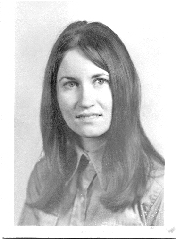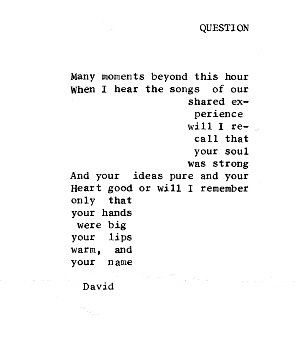April 9, 1999
Friday
April is National Poetry Month. Were I still in my classroom, I’d be just beginning my twentieth-century poetry unit. I’d gather up every issue of Poetry I had in the house, as well as every volume of contemporary poetry I owned. (I don’t just read poetry, I buy poetry.) And for six weeks or so my students and I would revel in the sounds and senses that the American tradition has given rise to.
One piece the kids especially liked was our study of concrete poetry — poetry which includes the shape of the words on the page as part of the meaning. Although I never demanded that they write a sonnet or a villanelle or even a heroic couplet, I did require an original concrete poem from them.
I like to set a good example. So I would bring out, for their edification and amusement, the one concrete poem that is in my canon. It is also the earliest extant poetic effort of mine, the only one that survives from my angst-filled late adolescence. I offer it here, for your edification and amusement, and my own self-indulgence.
 Before the poem, however, a look at the poet, and the genesis of the poem. At left you see me in 1967, twenty years old. I was in my second year of college, just moving in to what was the happiest time in my life before the present era. I was totally immersed in literature, under the very positive influence of a fine teacher, one Leon Feldman, himself a poet.
Before the poem, however, a look at the poet, and the genesis of the poem. At left you see me in 1967, twenty years old. I was in my second year of college, just moving in to what was the happiest time in my life before the present era. I was totally immersed in literature, under the very positive influence of a fine teacher, one Leon Feldman, himself a poet.
I was on the founding staff of the school’s first literary magazine. I spent many an afternoon and evening with other staff members, either in Mr. Feldman’s cramped, book-filled garret office on the third floor of South Hall, or in the editor’s apartment above the Pep Grill on Walnut Street downtown, where we’d chain-smoke cigarettes and read poetry to the sounds of the jazz bands that came on weekends. I think we even wore black turtlenecks.
When I wasn’t reading poetry, I was thinking about David Good, a navy veteran who had come to Harrisburg Area Community College on the GI Bill. He was 25 years old, and I thought he was the most worldly, most sophisticated, most mature individual I could ever hope to know.
He wanted to be a history teacher, and he liked art, music, and poetry. We had German class together, and one day he invited me to the opening art exhibit at the new State Museum. He took me to dinner at the home of some married friends, and to a wine and cheese party. We went to some medieval music concerts, and one afternoon we ditched our classes and went to see Dr. Zhivago. It went on like that for maybe two months, winter into spring.
And then, he stopped asking me out. He smiled and said hi in German class, but he didn’t walk out to my car with me afterward as he had before. He was never in the library or the snack bar when I was. When the madrigal choir I was in sang at the groundbreaking for the new campus, I saw him in the crowd, holding hands with a leggy blonde named Dierdre.
I can’t say I was heartbroken — it hadn’t been that serious — but I was sad, and confused, and hurt that he had cut me off for reasons I couldn’t fathom. And so I wrote a poem. Below is a scanned image of the original typed manuscript.

I remember thinking how clever I was to have said his heart was “good” when his last name was “Good.” I never showed it to him — like Emily Dickinson, I kept it as a secret comment on a relationship gone wrong. I moped for a few weeks, but recovered quickly and never really thought about him again, except at times like this.
Not long afterward I figured out that any name would fit at the end, as in “your name/Bill,” or “your name/Eddie,” or Bob or Joe or Fred. And I also noticed that it wasn’t necessarily about the screaming miseries of a true heartbreak, nor was it exclusively in the voice of the dumpee — one could use it if one were the dumper (which I was only on rare occasions), or for a mutually agreed upon separation.
So I began recycling it. I even offered it as a parting gift on occasion (Emily Dickinson did that too), to Fred (whose own version was a song he said was called “Maggy’s Waltz”), to another David, probably to Joe, and finally, twice, to a man named Bill. That really was a heartbreak of the Screaming Passionate Miseries Magnitude (both times), and I retired it.
Every time I used the poem in class, at least five girls wrote it down. Some of the boys did as well, and I cautioned them that they might want to change the phrase “your hands were big” to maybe “your hands were soft.” I like to think of those seventeen lines residing in sundry diaries and yearbooks and jewelry boxes, like cherished copies of “Footprints” tucked into prayer books.
And tonight I think of David, (both of them), and Fred, and Joe, and the one who earned it twice, wherever they are, and wonder if they ever think of me.